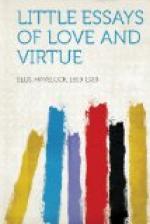We realise that never more than when we observe the distinction which conventional sex-morals so often makes between men and women. Failing to find in women exactly the same kind of sexual emotions, as they find in themselves, men have concluded that there are none there at all. So man has regarded himself as the sexual animal, and woman as either the passive object of his adoring love or the helpless victim of his degrading lust, in either case as a being who, unlike man, possessed an innocent “purity” by nature, without any need for the trouble of acquiring it. Of woman as a real human being, with sexual needs and sexual responsibilities, morality has often known nothing. It has been content to preach restraint to man, an abstract and meaningless restraint even if it were possible. But when we have regard to the actual facts of life, we can no longer place virtue in a vacuum. Women are just as apt as men to be afflicted by the petty jealousies and narrownesses of the crude sexual impulse; women just as much as men need the perpetual sublimation of erotic desire into forms of more sincere purity, of larger harmony, in gaining which ends all the essential ends of morality are alone gained. The delicate adjustment of the needs of each sex to the needs of the other sex to the end of what Chaucer called fine loving, the adjustment of the needs of both sexes to the larger ends of fine living, may well furnish a perpetual moral discipline which extends its fortifying influence to men and women alike.
It is this universality of sexual emotion, blending in its own mighty stream, as is now realised, many other currents of emotion, even the parental and the filial, and traceable even in childhood,—the wide efflorescence of an energy constantly generated by a vital internal mechanism,—which renders vain all attempts either to suppress or to ignore the problem of sex, however immensely urgent we might foolishly imagine such attempts to be. Even the history of the early Christian ascetics in Egypt, as recorded in the contemporary Paradise of Palladius, illustrates the futility of seeking to quench the unquenchable, the flame of fire which is life itself. These “athletes of the Lord” were under the best possible conditions for the conquest of lust; they had been driven into the solitude of the desert by a genuine deeply-felt impulse, they could regulate their lives as they would, and they possessed an almost inconceivable energy of resolution. They were prepared to live on herbs, even to eat grass, and to undertake any labour of self-denial. They were so scrupulous that we hear of a holy man who would even efface a woman’s footprints in the sand lest a brother might thereby be led into thoughts of evil. Yet they were perpetually tempted to seductive visions and desires, even after a monastic life of forty years, and the women seem to have been not less liable to yield to temptation than the men.




